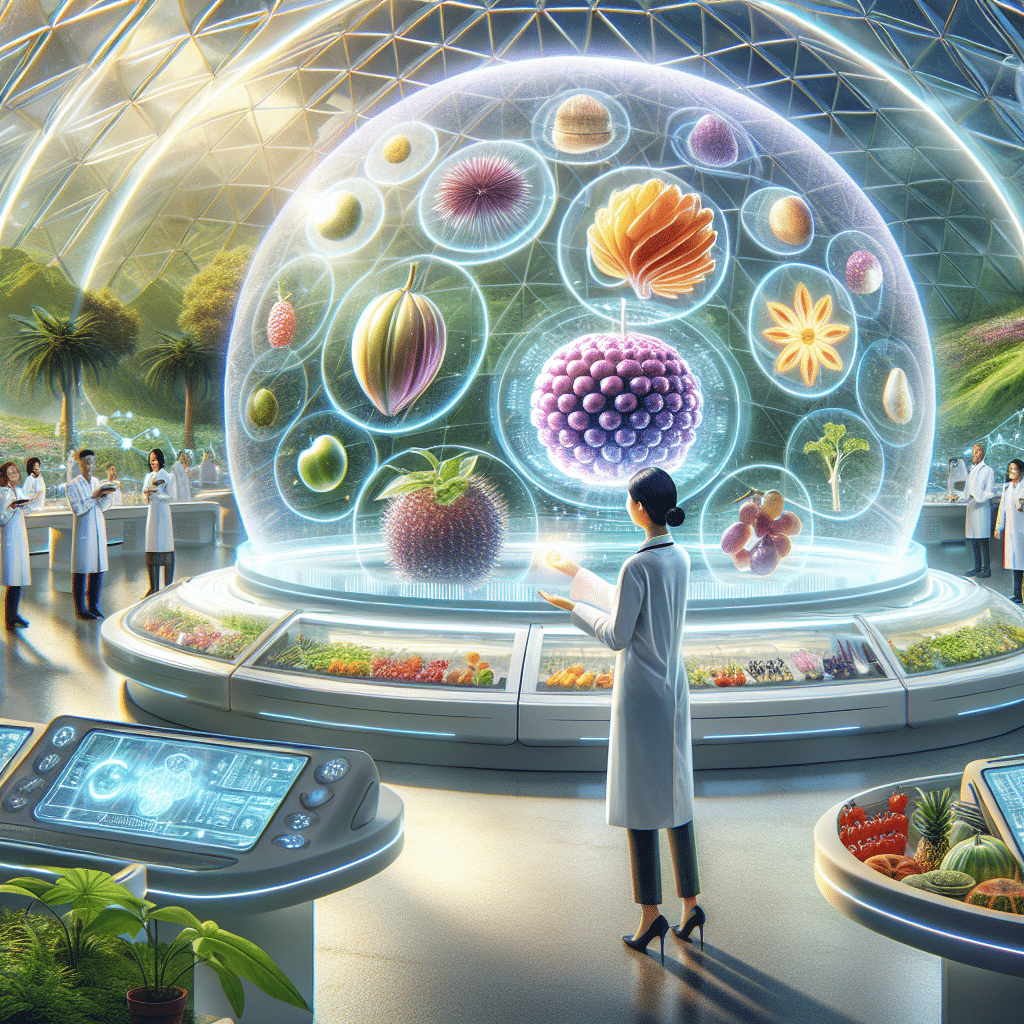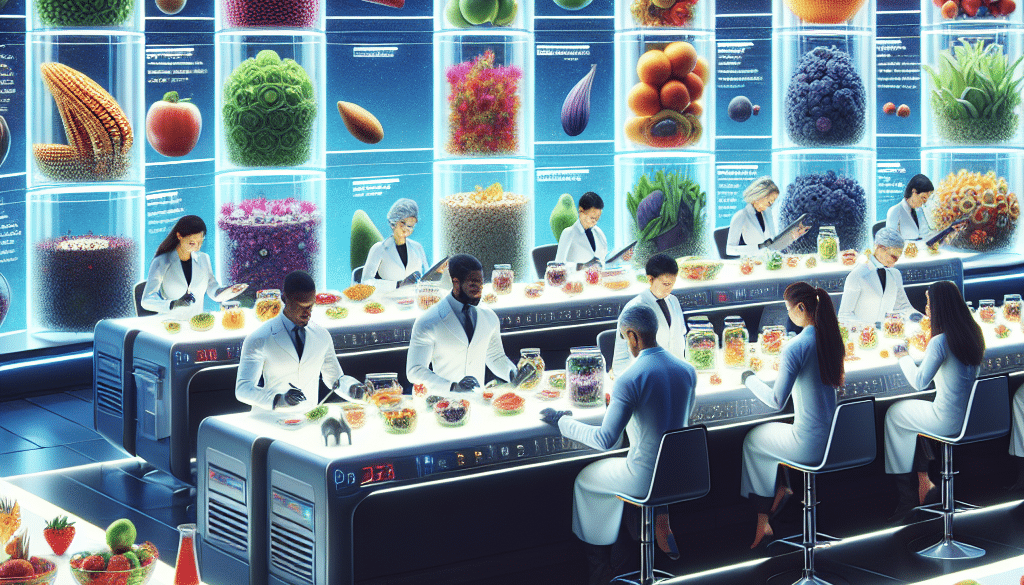Superfoods of the Future: Lab Innovations Unveiled
-
Table of Contents
- Lab-Grown Superfoods: The Next Nutritional Revolution
- The Rise of Lab-Grown Nutrition
- Cellular Agriculture: Meat and Dairy Reimagined
- Algae: The Superfood Powerhouse
- Genetic Modification: Tailoring Plants for Optimal Nutrition
- Fermentation Technology: Crafting Functional Foods
- Case Studies: Lab Innovations in Action
- Statistics: The Impact of Lab-Grown Superfoods
- Conclusion: Embracing the Future of Superfoods
- ETprotein: Your Source for High-Quality Protein Products
Lab-Grown Superfoods: The Next Nutritional Revolution

The quest for optimal health and nutrition has always been at the forefront of human endeavors. As our understanding of science and technology evolves, so does our ability to innovate in the realm of food production. The concept of ‘superfoods’—nutrient-rich foods considered especially beneficial for health and well-being—has captivated the public’s imagination for years. However, the future of superfoods is poised to take a dramatic turn, thanks to groundbreaking lab innovations. In this article, we will explore the exciting developments in lab-grown superfoods that promise to redefine our approach to nutrition and sustainability.
The Rise of Lab-Grown Nutrition
Scientific advancements have paved the way for the cultivation of superfoods in controlled laboratory environments. This method of food production, often referred to as cellular agriculture or synthetic biology, involves growing food from cells, tissues, or microorganisms without the need for traditional farming practices. Here are some of the key innovations that are shaping the future of superfoods:
- Cellular agriculture for meat and dairy alternatives
- Algae and microalgae cultivation for high-density nutrients
- Genetic modification to enhance the nutritional profile of plants
- Fermentation technology to produce functional foods and ingredients
Cellular Agriculture: Meat and Dairy Reimagined
One of the most significant areas of lab innovation is the development of cultured meat and dairy products. Companies like Memphis Meats and Perfect Day are at the forefront of this movement, creating animal products from cell cultures rather than raising livestock. This approach not only addresses ethical concerns related to animal welfare but also significantly reduces the environmental impact of traditional animal farming. Moreover, lab-grown meat and dairy can be engineered to have enhanced nutritional profiles, including higher levels of beneficial fatty acids, vitamins, and minerals.
Algae: The Superfood Powerhouse
Algae, particularly microalgae like spirulina and chlorella, are already recognized for their impressive nutrient content. Rich in proteins, omega-3 fatty acids, vitamins, and antioxidants, these aquatic organisms are true superfoods. Innovations in bioreactors and photobioreactors have enabled the large-scale, sustainable cultivation of algae, making it a viable and eco-friendly source of high-quality nutrition.
Genetic Modification: Tailoring Plants for Optimal Nutrition
Advances in genetic engineering have made it possible to enhance the nutritional value of plants. By modifying the genetic makeup of crops, scientists can increase their content of specific nutrients, such as vitamins, minerals, and antioxidants. Golden rice, for example, has been genetically modified to produce beta-carotene, a precursor to vitamin A, addressing vitamin A deficiency in populations where rice is a staple food.
Fermentation Technology: Crafting Functional Foods
Fermentation has been used for centuries to preserve food and enhance its flavors. Modern fermentation technology, however, goes a step further by enabling the production of functional foods with added health benefits. Through the fermentation of plant-based ingredients, companies can create products that contain bioactive compounds, probiotics, and other health-promoting substances.
Case Studies: Lab Innovations in Action
Several companies and research institutions have made significant strides in bringing lab-grown superfoods to the market. Here are a few examples:
- Memphis Meats’ lab-grown meatballs and chicken
- Perfect Day’s animal-free dairy proteins
- Solazyme’s microalgae-based products for food and personal care
- Amyris’ fermentation-derived sweeteners and nutritional ingredients
These case studies demonstrate the potential of lab innovations to create sustainable, nutritious, and ethical food options for the future.
Statistics: The Impact of Lab-Grown Superfoods
The potential impact of lab-grown superfoods on health, the environment, and the economy is substantial. According to a study by the Good Food Institute, cultured meat could reduce land use by more than 95%, greenhouse gas emissions by up to 96%, and water use by up to 78% compared to conventional meat production. Additionally, the global algae market is expected to reach $45.3 billion by 2023, indicating a growing demand for these nutrient-dense superfoods.
Conclusion: Embracing the Future of Superfoods
The innovations in lab-grown superfoods represent a paradigm shift in our approach to nutrition and sustainability. By harnessing the power of science and technology, we can create food products that are not only rich in essential nutrients but also kinder to the planet and its inhabitants. As we continue to explore the vast potential of lab innovations, the superfoods of the future may soon become a staple in our diets, offering a promising solution to global health and environmental challenges.
ETprotein: Your Source for High-Quality Protein Products
In light of the advancements in lab-grown superfoods, it’s important to recognize companies that are contributing to the future of nutrition. ETprotein is one such company, offering a range of high-quality protein products that align with the values of health, sustainability, and innovation. Their organic bulk vegan proteins and L-(+)-Ergothioneine (EGT) are perfect for those seeking ethical and environmentally friendly nutritional solutions. With a commitment to non-GMO, allergen-free products with high purity levels, ETprotein is an excellent choice for consumers and industries looking to embrace the superfoods of the future.
About ETprotein:
ETprotein, a reputable protein and L-(+)-Ergothioneine (EGT) Chinese factory manufacturer and supplier, is renowned for producing, stocking, exporting, and delivering the highest quality organic bulk vegan proteins and L-(+)-Ergothioneine. They include Organic rice protein, clear rice protein, pea protein, clear pea protein, watermelon seed protein, pumpkin seed protein, sunflower seed protein, mung bean protein, peanut protein, and L-(+)-Ergothioneine EGT Pharmaceutical grade, L-(+)-Ergothioneine EGT food grade, L-(+)-Ergothioneine EGT cosmetic grade, L-(+)-Ergothioneine EGT reference grade and L-(+)-Ergothioneine EGT standard. Their offerings, characterized by a neutral taste, non-GMO, allergen-free attributes, with L-(+)-Ergothioneine purity over 98%, 99%, cater to a diverse range of industries. They serve nutraceutical, pharmaceutical, cosmeceutical, veterinary, as well as food and beverage finished product distributors, traders, and manufacturers across Europe, USA, Canada, Australia, Thailand, Japan, Korea, Brazil, and Chile, among others.
ETprotein specialization includes exporting and delivering tailor-made protein powder and finished nutritional supplements. Their extensive product range covers sectors like Food and Beverage, Sports Nutrition, Weight Management, Dietary Supplements, Health and Wellness Products, and Infant Formula, ensuring comprehensive solutions to meet all your protein needs.
As a trusted company by leading global food and beverage brands and Fortune 500 companies, ETprotein reinforces China’s reputation in the global arena. For more information or to sample their products, please contact them and email sales(at)ETprotein.com today.












